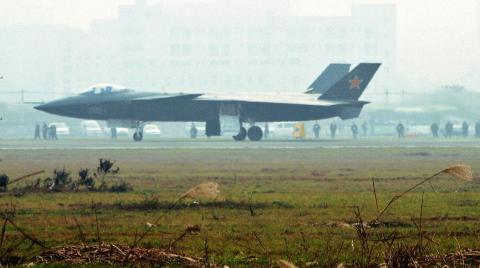China’s radar-eluding stealth fighter made its first-known test flight yesterday, marking dramatic progress in the country’s efforts to develop cutting-edge military technologies.
The prototype plane, dubbed the J-20, flew for about 15 minutes over an airfield in the southwestern Chinese city of Chengdu, where it was spotted carrying out runway tests last week, Kanwa Asian Defense magazine editor Andrei Chang said.
Photos of the plane in flight and on the ground surrounded by men in civilian clothes and army overcoats were also posted on unofficial Chinese military Web sites. A J-10 fighter — China’s last homegrown jet — flew behind it as a chase plane.

PHOTO: REUTERS
The test flight comes on the second day of a visit to China by US Secretary of Defense Robert Gates and the normally secretive military made no attempt to hide it or remove photos and reports about the J-20 from the Internet.
Unawares
However, a senior US defense official said the test was carried out without informing Chinese President Hu Jintao (胡錦濤) and the country’s civilian leadership.
“It was clear that none of the civilians in the room had been informed [of the test flight],” said the official, who spoke on condition of anonymity, describing a meeting between Hu and Gates.
When Gates asked Hu directly about the test flight of the stealth fighter during their meeting at the Great Hall of the People, Hu and his aides were clearly caught off-guard, the senior official said.
Yet, Hu “said the tests had nothing to do with my visit” and had been previously scheduled, said Gates, who added that he accepted the explanation.
In recent days, Chinese Web sites and some popular newspapers, which can come under a heavy grip of censorship, have carried many reports and pictures claiming to show the stealth fighter being tested on the ground.
However, the government had been silent about the fighter until Hu’s remarks to Gates.
The timing and hands-off approach is apparently intended to send the message that Beijing is responding to calls from the US and others to be more transparent about its defense modernization and future intentions.
Although likely many years from entering China’s inventory, the J-20 is a potential rival to the US’ F-22 Raptor, the only stealth fighter -currently in service. The US is also employing stealth technology on the F-35 Joint Strike Fighter, while Russia’s Sukhoi T-50’s stealth fighter made its maiden flight last year and is set to enter service in about four years.
In the photos, China’s twin--engine J-20 appears larger than either the Russian or US fighters, -potentially allowing it to fly farther and carry heavier weapons.
Threat to Taiwan
The J-20 would pose the greatest immediate threat to Taiwan. Taiwan’s air force is composed mostly of aging US F-16s and French Mirage jets and its electronic warning systems would find it difficult to cope with stealth technology.
A Chinese stealth fighter would “seriously undermine the Taiwan air force’s advantages,” Tamkang University’s Alexander Huang (黃介正) said.
While a state newspaper reported last week on the plane’s appearance, the Chinese government and military have yet to comment officially. People who answered phones at government and Chinese Communist Party offices in Chengdu, as well as the plane’s developer — the Chengdu Aircraft Industrial Group — all refused to comment.

A Chinese aircraft carrier group entered Japan’s economic waters over the weekend, before exiting to conduct drills involving fighter jets, the Japanese Ministry of Defense said yesterday. The Liaoning aircraft carrier, two missile destroyers and one fast combat supply ship sailed about 300km southwest of Japan’s easternmost island of Minamitori on Saturday, a ministry statement said. It was the first time a Chinese aircraft carrier had entered that part of Japan’s exclusive economic zone (EEZ), a ministry spokesman said. “We think the Chinese military is trying to improve its operational capability and ability to conduct operations in distant areas,” the spokesman said. China’s growing

Taiwan yesterday denied Chinese allegations that its military was behind a cyberattack on a technology company in Guangzhou, after city authorities issued warrants for 20 suspects. The Guangzhou Municipal Public Security Bureau earlier yesterday issued warrants for 20 people it identified as members of the Information, Communications and Electronic Force Command (ICEFCOM). The bureau alleged they were behind a May 20 cyberattack targeting the backend system of a self-service facility at the company. “ICEFCOM, under Taiwan’s ruling Democratic Progressive Party, directed the illegal attack,” the warrant says. The bureau placed a bounty of 10,000 yuan (US$1,392) on each of the 20 people named in

Nine retired generals from Taiwan, Japan and the US have been invited to participate in a tabletop exercise hosted by the Taipei School of Economics and Political Science Foundation tomorrow and Wednesday that simulates a potential Chinese invasion of Taiwan in 2030, the foundation said yesterday. The five retired Taiwanese generals would include retired admiral Lee Hsi-min (李喜明), joined by retired US Navy admiral Michael Mullen and former chief of staff of the Japan Self-Defense Forces general Shigeru Iwasaki, it said. The simulation aims to offer strategic insights into regional security and peace in the Taiwan Strait, it added. Foundation chair Huang Huang-hsiung

PUBLIC WARNING: The two students had been tricked into going to Hong Kong for a ‘high-paying’ job, which sent them to a scam center in Cambodia Police warned the public not to trust job advertisements touting high pay abroad following the return of two college students over the weekend who had been trafficked and forced to work at a cyberscam center in Cambodia. The two victims, surnamed Lee (李), 18, and Lin (林), 19, were interviewed by police after landing in Taiwan on Saturday. Taichung’s Chingshui Police Precinct said in a statement yesterday that the two students are good friends, and Lin had suspended her studies after seeing the ad promising good pay to work in Hong Kong. Lee’s grandfather on Thursday reported to police that Lee had sent